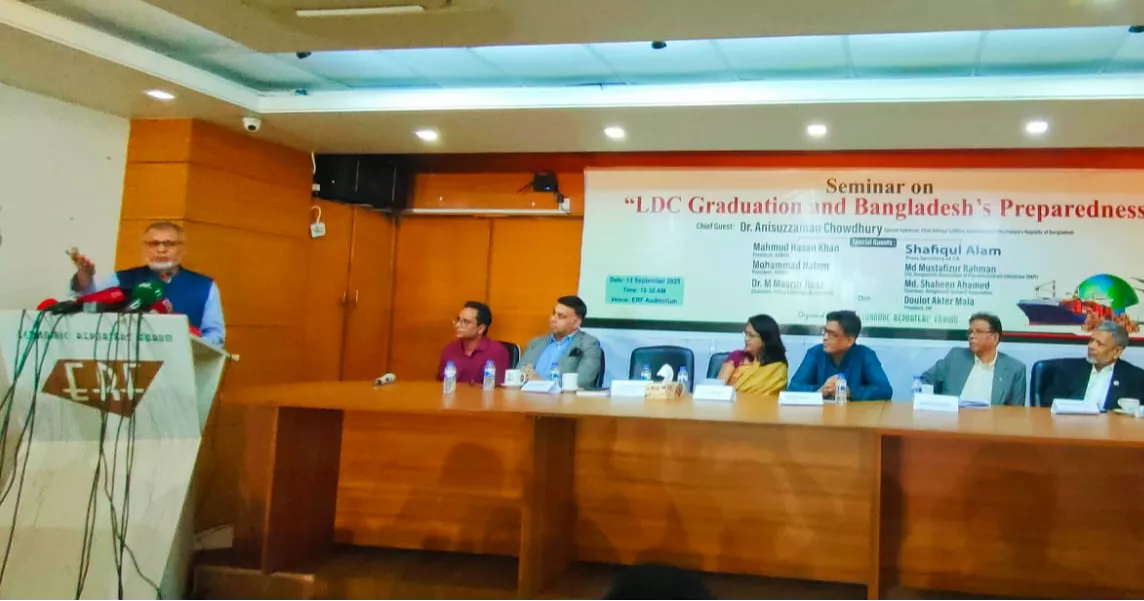Staff Correspondent
Published:2025-09-13 23:09:15 BdST
Bangladesh not in a position to defer LDC graduation: Anisuzzaman
Chief Adviser’s Special Assistant Anisuzzaman Chowdhury on Saturday said Bangladesh is not in a position to defer its graduation from the Least Developed Country (LDC) category, given the country’s current economic and social conditions.
He made the remarks while speaking at a seminar titled ‘LDC Graduation and Bangladesh’s Preparedness’, organised by the Economic Reporters’ Forum (ERF) at its Paltan auditorium.
Chief Adviser’s Press Secretary Shafiqul Alam, BKMEA President Muhammad Hatem and economist M Masrur Reaz were present at the event.
Senior Vice-President of BGMEA Inamul Haq Khan and Chief Executive Officer of the Bangladesh Association of Pharmaceutical Industries Md Mustafiz Rahman also spoke at the seminar, sharing recommendations from their respective industry sectors.
Anisuzzaman said the interim government will not process any proposal for a deferred LDC graduation because such a decision should be taken by the next elected government.
He said Bangladesh is in a position where an application to delay graduation is unlikely to be accepted by the UN Council, as it would require the support of a majority of the 193 member states.
Anisuzzaman suggested that businesses study the implications of LDC graduation in greater depth, pointing out that not all sectors will be affected.
Some markets, such as those in Europe, may reduce certain facilities three years after graduation.
Press Secretary Shafiqul Alam said Bangladesh missed the opportunity for capacity building and proper planning during the ‘golden period’ from 2021 to 2024.
He urged the private sector to work on capacity building and support the government in creating a smooth graduation roadmap so the export sector can enhance its capacity, as well as labour and environmental compliance standards.
Referring to the Rana Plaza disaster, Shafiqul said garment exporters improved safety and security due to pressure from buyers.
Similarly, the private sector must strengthen compliance in Bangladesh’s manufacturing industries, as several laws and requirements now govern access to different global markets.
Shafiqul also encouraged entrepreneurs to be bold in facing risks and challenges to achieve sustainable growth and profits with international buyers.
Citing Cambodia as an example, he said buyers there pay $208 per worker, yet export orders remain steady. In Bangladesh, workers receive only $105, yet businesses claim higher wages would lead to a loss of orders.
“This is not a matter of losing orders; it is actually the failure of our private sector’s capacity to grow,” he said, adding, “Without labour and environmental compliance, the manufacturing sector cannot compete globally.”
He added that LDC graduation could offer export advantages for factories that meet compliance requirements.
Economist Masrur Reaz said both the private sector and the government must work together to produce a roadmap for smooth LDC graduation while improving capacity and compliance.
BKMEA President Mohammad Hatem called for easing regulations by increasing online verification and enhancing the capacity of the National Board of Revenue (NBR) and customs before graduation.
ERF President Daolat Akter Mala presided over the seminar, while General Secretary Abul Kashem moderated the discussion.
They urged businesses to focus on building the capacity of the manufacturing sector to improve export-handling efficiency and to engage in more detailed discussions on specific issues and roadmaps likely to be affected by LDC graduation.
Unauthorized use or reproduction of The Finance Today content for commercial purposes is strictly prohibited.


